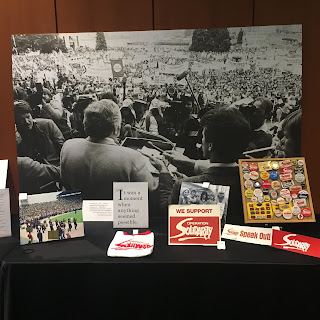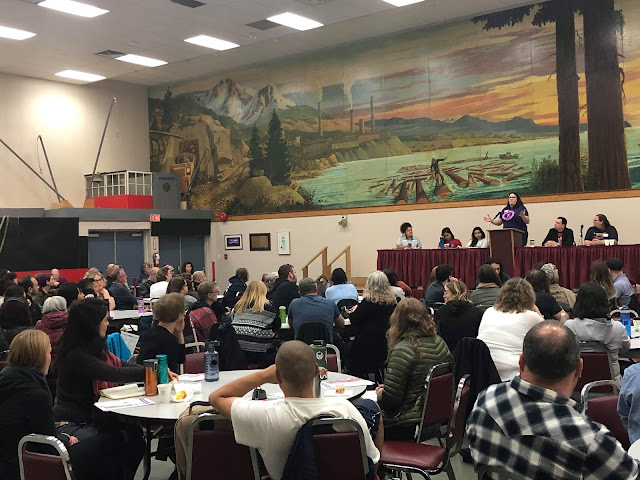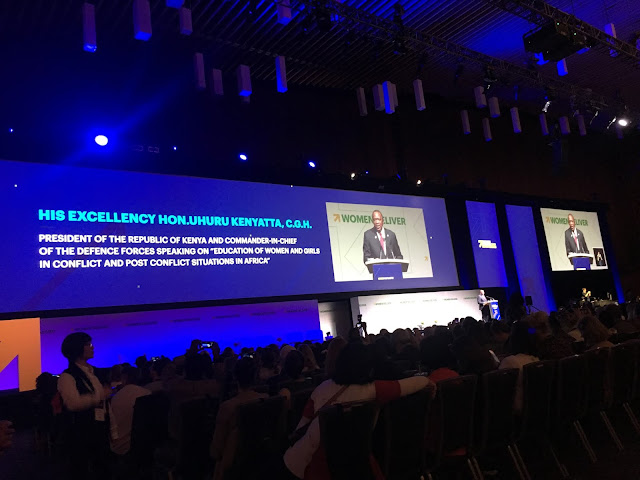Solidarity35 - "It Seemed Anything Was Possible" - Film and Panel Discussion
 What is this all about? Here's the short version. In 1983, the Socred Government introduced 26 oppressive bills and a harsh restraint budget to strip the province of social services. This including eliminating the Human Rights Commission, Employment Standards, healthcare and social service facilities and so much more. It also included Bill 2 that would restrict collective bargaining to wages and benefits only - language would no longer be on the table. Job security would be a thing of the past and union executives in the public sector were targets - just look at John Shields and Dianne Wood of the BCGEU. Community groups and trade unions united in what is BC's greatest fight back - the Solidarity Coalition and Operation Solidarity. There are so many lenses and angles to the story that you can look it up in more detail yourself.
What is this all about? Here's the short version. In 1983, the Socred Government introduced 26 oppressive bills and a harsh restraint budget to strip the province of social services. This including eliminating the Human Rights Commission, Employment Standards, healthcare and social service facilities and so much more. It also included Bill 2 that would restrict collective bargaining to wages and benefits only - language would no longer be on the table. Job security would be a thing of the past and union executives in the public sector were targets - just look at John Shields and Dianne Wood of the BCGEU. Community groups and trade unions united in what is BC's greatest fight back - the Solidarity Coalition and Operation Solidarity. There are so many lenses and angles to the story that you can look it up in more detail yourself. Along with the walking tour there are a few events to commemorate Solidarity35. This includes an online exhibit, 2 panel discussions - It Seemed Anything Was Possible centered on the protests and rallies and then A Time to Act that will focus more on the Kelowna Accord and the end of the coalition.
So onto It Seemed Anything Was Possible. At the event the BCLHC brought the actual flag that was created and flown at the Tranquille Occupation in Kamloops, buttons, flags, placards, and photos. What was the coolest thing though was all the people who arrived to attend the event (I worked the registration table with Joey Hartman), many of them were in the film we were going to watch or were there at the events in 1983. As they filtered in, Joey would tell me who they were and how they were connected to the labour movement.
Film: Common Cause (1984)
 This film is 52 minutes of footage and interviews from 1983 or 1984 while the events were still fresh in people's minds. It's so interesting to see what was covered. Back when BCTV would report on labour issues. When the Sun would have someone covering the labour beat - now the only coverage unions get on TV is if there is a strike. Back in the 1980s the public knew who our labour leaders were - and now well...our members barely know who their own people are..anyway, I digress. The film featured speeches with folks like Art Kube, Jack Munro, Hanne Jensen, Gary Steeves, Peter Leask, Bill Bennet, Rosemary Brown...amazing. The footage of the BCGEU flag flying at the Tranquille Occupation was cool - made even more real when I walked by the flag just before taking my seat in the theatre.
This film is 52 minutes of footage and interviews from 1983 or 1984 while the events were still fresh in people's minds. It's so interesting to see what was covered. Back when BCTV would report on labour issues. When the Sun would have someone covering the labour beat - now the only coverage unions get on TV is if there is a strike. Back in the 1980s the public knew who our labour leaders were - and now well...our members barely know who their own people are..anyway, I digress. The film featured speeches with folks like Art Kube, Jack Munro, Hanne Jensen, Gary Steeves, Peter Leask, Bill Bennet, Rosemary Brown...amazing. The footage of the BCGEU flag flying at the Tranquille Occupation was cool - made even more real when I walked by the flag just before taking my seat in the theatre. The film is uploaded on Youtube and I high recommend it.
After the film was over Dr. Bethany Hastie moderated a panel and Q&A with 4 people who featured prominently in the film. It was amazing to see them in person, 35 years later.
Panel Discussion:
Hanne Jensen - Former Director, Human Rights Branch
For Hanne Jensen seeing the documentary again brought back memories of how destructive the legislation was. BC went from having a progressive human rights code and commission where the commission and the branch could operate without political interference. The commission was responsible for the education and promotion (no complaints) of human rights (staffed by political appointments) and the branch was an arm of the Ministry of Labour, where civil servants would adjudicate complaints - unsettled cases would then be referred to the Minister.The Socreds moved the adjudication piece to the commission and blurred the lines of both offices.
As Director of the HR Branch, she was under increasing scrutiny and politicization at all levels. She heard about the closure of her branch and the firing of the staff when the legislation was introduced and a reporter called her for comment. BC would no longer have legislative protections against discrimination. They weren't interested in an orderly transition nor were they interested in Hanne's knowledge and expertise. When she and her colleagues were fired, 500+ unsettled files sat in the offices (you can see this in the film - piles of file folders stacked up in the deserted offices of the former Human Rights branch) - never settled, left in limbo - no recourse available to the complainants.
After she was fired she left BC and took a job in Ottawa and went on to continue working in Human Rights. As she made her final remarks she reflected on the loss to British Columbians in July of 1983 that ultimately made her leave.
Hon. Peter Leask - BC Bar and Legal Aid
Back in the day Legal Aid was a department that was resourced and staffed. When the restraint budget was tabled, Legal Aid was cut - 5 offices around the province were closed, resulting in layoffs and cuts to payments of lawyers to the tune of 12%. Yikes. This triggered a protective attitude of the legal profession and saw many different community groups and trade unions come together to figure out what to do next.
In 1991 the largest investment in Legal Aid (under the NDP) occurred. Legal fees would be taxed under PST and the money collected in those taxes would go towards Legal Aid - good idea but it didn't materialize the way they thought it would. From 1991-2018 legal aid funding is chipped at - little by little, less and less money available to those who need it. Finally this year the NDPGreen government has invested $12-13 million (focusing on family and indigenous legal aid) - still not nearly enough money.
Gary Steeves - Retired BCGEU staffer (Director of Organizing and Field Services)
Gary's part in the panel was focused on the impact of the restraint budget and legislation on public sector unionized workers and collective bargaining rights. For BCGEU government workers, they had no lay off provisions in their contract - but it didn't matter, the government started to fire workers left, right and centre. The union wasn't prepared to allow workers' rights to be thrown away - they knew they needed to organize and resist in every way they could. As he told the story of Tranquille and reflected on his experience, he said Solidarity taught him that people will seek treatment and social justice are powerful motivations and no corporation or government should ever take that for granted. Anything is possible and the power of collective should not be understated.
I think one of the coolest stories of direct action is the occupation of the Tranquille Sanatorium in Kamloops. The government had Tranquille on the schedule for closure. The workers who had spent years looking after their patients, knew that when the facility closed their patients would have no where to go where they would have the support they'd need to live. Unemployment in Kamloops was hovering at 20% and the community was rocked by this news. They had a decision to make - to accept the news and try to move on or to FIGHT. So they kicked out management, took over the facility and ran it for a number of weeks so they could ensure that each resident had a place to go when the facility shut down. During the occupation someone grabbed a sheet, a marker and a styrofoam cup created and flew the BCGEU flag on top of the building (also seen in the film), to show they meant business and that the facility would not close down overnight on their watch.
Dr. Larry Kuehn - Past President of the BC Teachers' Federation
For the Teachers, Solidarity was one of the galvanizing events that really brought them into the labour movement. They were not a union at the time and were facing some serious cutbacks - Bill 3 would see the elimination of 3000 teachers across the province. They had CUPE support staff on board as well as the college and university workers - public education was ready to walk together!
 Prior to 1983, Teachers could only bargain wages and benefits - no other provisions would and could be bargained. One way to get the word out was to announce their plans on the 6pm news on BCTV. Back in 1983 you could guarantee that the majority of British Columbians would watch the news and so the BCTF would make these announcements to get to their members.
Prior to 1983, Teachers could only bargain wages and benefits - no other provisions would and could be bargained. One way to get the word out was to announce their plans on the 6pm news on BCTV. Back in 1983 you could guarantee that the majority of British Columbians would watch the news and so the BCTF would make these announcements to get to their members.Larry was the only one to really reference the end of the coalition and the bitter disappointment that's still felt to this day. He ended his section by saying "no victory is ever complete and that is why we stay in this struggle." Preach!
Conclusion
The Q&A was interesting - it wasn't really questions and answers. Because there were so many people in the audience who were there, they shared their experiences. The signing of the Kelowna Accords still angers many in the labour movement, their anger still as bitter and fervent as it was that day in November 1983 (details at the next event). The comments were still pointed at the late Jack Munro selling out the labour movement. The physical and emotional toil it took on Art Kube - the tension in theroom was palpable and it's 35 years later, can you imagine what it was like at the time??
 Someone asked how difficult it was to organize the events of 1983 and the panelists seem to agree that it wasn't hard. When the sheer amount of draconian legislation coupled with a devastating budget, working people had no choice.
Someone asked how difficult it was to organize the events of 1983 and the panelists seem to agree that it wasn't hard. When the sheer amount of draconian legislation coupled with a devastating budget, working people had no choice. While the end of Solidarity is still controversial we know one thing for sure. It marked the beginning of the end of the Social Credit Party in BC. Eventually they not only lost an election the party dissolved (and came back in a different form - BC Liberals, puke).
I won't be able to attend the next event, but I'm sure it will be just as informative and interesting as this one!








Comments
Post a Comment